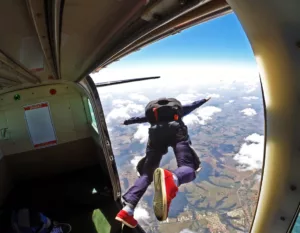The surviving family members of eight skydivers killed in a 2019 plane crash in Sweden have sued the Victorian manufacturer of the aircraft in a Melbourne court.
The Airvan GA8 aircraft crashed at Storsandskar after departure from Umeå airport as the skydivers – preparing to exit the aircraft – all moved rearwards critically altering its centre of gravity.
 The aircraft went into a nose-down aerodynamic stall and then into an uncontrolled spin from which the pilot could not recover. The parachutists could not exit before the aircraft broke up and crashed into the ground killing all on board.
The aircraft went into a nose-down aerodynamic stall and then into an uncontrolled spin from which the pilot could not recover. The parachutists could not exit before the aircraft broke up and crashed into the ground killing all on board.
Swedish aviation investigators concluded among other things that the overloaded aircraft was being flown by a pilot who lacked the requisite experience and skills for the operation and there were no deficiencies in the aircraft itself.
They also observed that the aircraft flight manual provided no clear directions as to the means by which its centre of gravity should be calculated when carrying parachutists, thereby depriving pilots of an appropriate basis upon which to conduct their mandatory pre-flight weight and balance calculations.
After a misconceived carrier’s liability compensation claim in the District Court in Umeå was discontinued, the families turned their attention south to sue for their losses arising out of the parachute air crash defects.
Gippsaero – based at Latrobe Regional Airport – manufactured the plane in 2012 and sold it to a Swedish financier in May 2013 for use by the Umeå Parachute Club north of Stockholm.
‘Type Certificates’ issued by Australian, European and US aviation regulators certifying airworthiness of the aircraft design and construction were held by separate company, GA8 Airvan.
The families alleged that both companies owed a duty of care to all users of Airvan GA8 aircraft to have included in the flight manual adequate information as to the conditions, limitations, risks and procedures required to be adopted for its safe use in parachuting operations.
They also contended that the certification of the aircraft for parachuting was unsound in the absence of a means to ensure centre of gravity stability while skydivers moved about and jumped from the aircraft.
The Victorian companies – irked by the lawsuit – promptly filed an application to send the claim back to Sweden on the basis that Victoria was “a clearly inappropriate forum.
They relied on the crash having occurred in Sweden and that those who investigated it all resided there, as did most of the family members of the deceased occupants.
They pointed out that the parachuting club would need to be joined to the proceedings as a potential defendant and that language difficulties; witnesses’ travel and accommodation expenses; and translation fees put the cost of running the proceedings in Victoria at too high a sum.
On the other hand, the families argued that it was law of Victoria that applied to the design and manufacture of the aircraft and the supply of the associated flight manual because all of those things took place there.
Justice John Dixon observed in the Victorian Supreme Court that his task was not to decide whether Sweden was more convenient or more suitable as a venue for the trial but rather, whether Victoria was “clearly appropriate” as the place in which it should be conducted.
The correct approach was – he noted – to focus attention on where the negligent act of the potential wrongdoer took place, rather than where the damage occurred which may just be “fortuitous”.
He distinguished the current circumstances to those involving a misrepresentation where the substantive defendant misconduct usually occurs where the information is received and relied upon.
In this instance, the acts of the defendants that were being called into question occurred as part of the manufacturing and certification process in Victoria. The duty was owed to all international customers, not just those in Sweden.
The applicable law to resolve liability may be of very great or very little importance – the judge observed – but where it coincides with the law of the chosen forum, the selected forum cannot be an inappropriate forum.
“I have not been persuaded by the defendants that a trial of this proceeding in Victoria will be oppressive or vexatious [and] have concluded that the defendants have failed to demonstrate that Victoria is a clearly inappropriate forum,” he ruled.
Victoria was thus the proper forum for the dispute and the application for a permanent stay of the proceeding was dismissed.
The ultimate trial will like occur in 12-18 months if the mater is not resolved sooner.
Kvist v GippsAero Pty Ltd & Anor [2023] VSC 275, Dixon J, 30 May 2023
Categories: aircraft accident , Aviation Law


